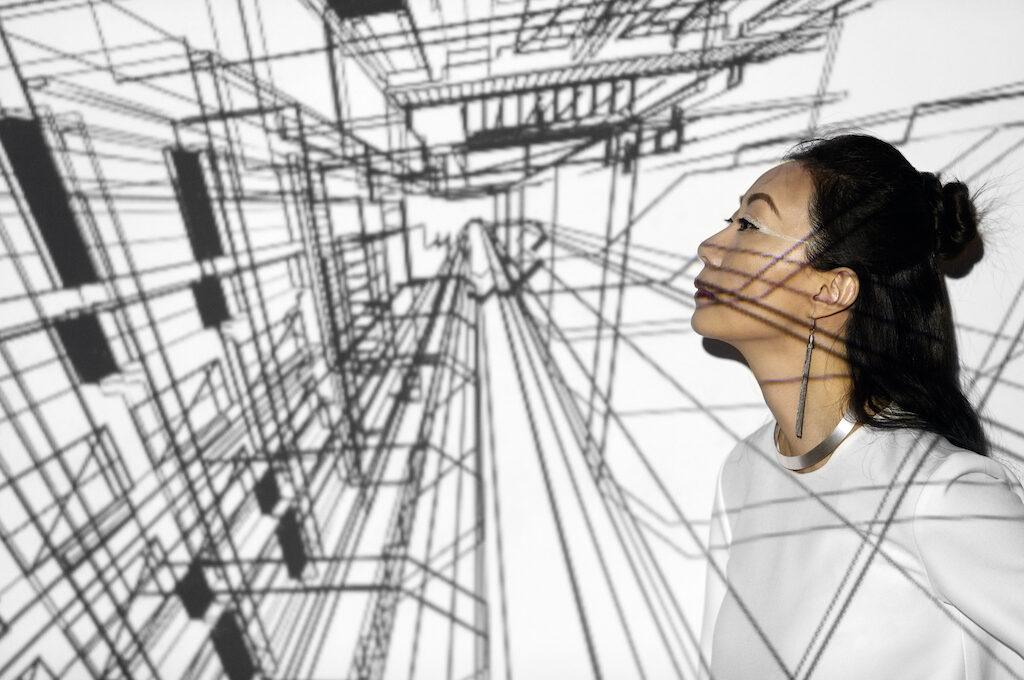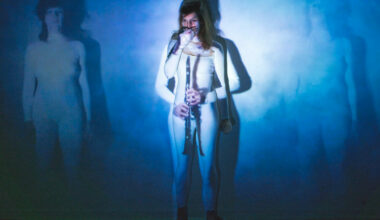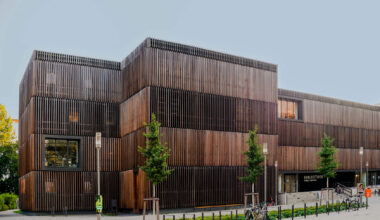In her compositions, Ying Wang deals with topics such as environmental pollution, global social grievances, political persecution and human relationships with technology. Coming from Shanghai she first went to Cologne and then to Berlin. She established herself as a composer who critically reflects and re-thinks chamber and orchestral music. Her original homeland China, as well as her new one in Berlin, form a contrast that is thematically and musically part of her works.
In her work she is always looking for new links to other media and arts, such as dance, video, digital art, light, visual arts and performance. Her latest world premiere is the composition “DIS-A”, commissioned by Heroines of Sound and played by ensemble mosaik, that addresses the disappearance of dissident critics, artists, and journalists under authoritarian regimes. The piece condenses a multitude of emotions and information into a polyphonic and ambiguous web from which the focus is suddenly removed – the material greatly reduced.
FACTS
1. dis-appearance is anything but a calm, quiet process. The disappearer fights back.
2. It is not only the person who disappears. Often, after a short time, hardly any researchable traces of their work can be found on the web.
3. Resistance, energy, anger and despair
QUESTIONS
1. What is the biggest inspiration for your music?
I live and form my identity as a contemporary composer from China with a keen and critical eye on the entanglements of politics, culture, society and technology and their consequences. I am looking for a contrasting and multi-shaped combination of my three major tools: the traditional instruments of the European music and their extended techniques, the critical examination of my Chinese heritage and the current possibilities of electronics. In my music I transform the world of today, its crises and tragedies, as well as its beauty and diversity – there is screaming criticism and delightful admiration for this world in my music.
2. How and when did you get into making music?
I think it started when I was still in my mother’s belly.
3. What are 5 of your favourite albums of all time?
Bjork: Vesperetine
Diotima : Bartók-Complete String Quartets
Schnittke: historia von D.Johan Fausten
Kimbra: Vows
Kairos: Beat Furrer- Fama
4. What do you associate with Berlin?
Museum, festival, friends and concerts
5. What’s your favourite place in your town?
Somewhere near to mountains and the salt water.
6. If there was no music in the world, what would you do instead?
make sound, then make music.
7. What was the last record/music you bought?
WERGO-Ying WANG – TunTu: WER 73472
8. Who would you most like to collaborate with?
Ensemble MusikFabrik / Ensemble Ascolta/ Ensemble Modern und Bjork.
9. What was your best gig (as performer or spectator)?
Als composer: with Ensemble Klangforum in Wien – SCHMUTZ, als spectator: Ensemble Resonanz and Johannes Kalitzke in Hamburg, Elbphilharmonie.
10. How important is technology to your creative process?
It is a “Must” these days. For composer it is extreme important. To know, what is the new development in science field.
11. Do you have siblings and how do they feel about your career/art?
I just have a composer father; he gives me a lot of support. He’s name is XilinWANG
Wang has worked with numerous orchestras in Europe and Asia. In 2013 she was awarded the the Giga-Hertz Prize and the composer prize of the 5th Brandenburg Biennale. In addition to the IEMA scholarship in 2009/10, she received other scholarships from the Experimental Studio of the SWR, the Federal Ministry of Vienna and at the suggestion of Peter Eötvös from the Herrenhaus Edenkoben. In 2014 she won the 35th Irino prize for chamber orchestra in Tokyo. In 2015, Deutschlandfunk invited her as “composer in residence” to the “Forum Neuer Musik” festival in Cologne. In 2017 she received the Heidelberg Artist Prize. In 2020 she received a scholarship from the German Academy in Rome.
Photo © Maria Frodl


